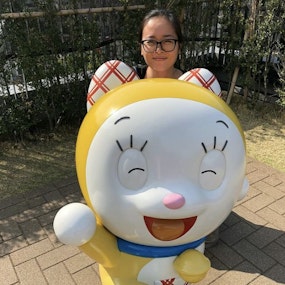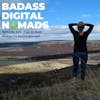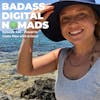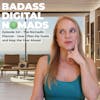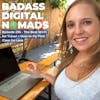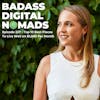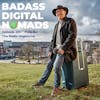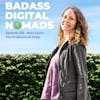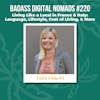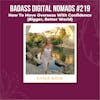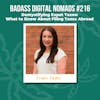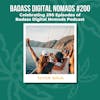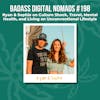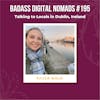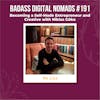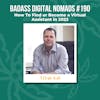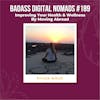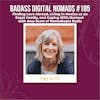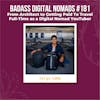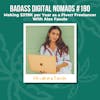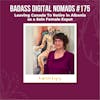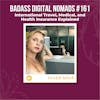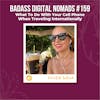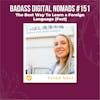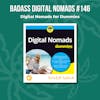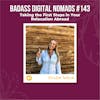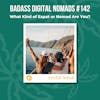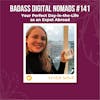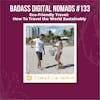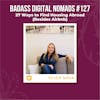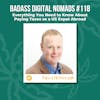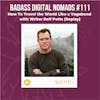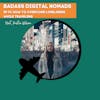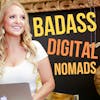Being a Digital Nomad in Southeast Asia With Giang Cao From Vietnam
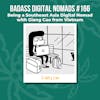
(UPDATED 8/8/22) How a graphic designer from Vietnam tripled her income by quitting her job to become a freelancer. Location-independent solo traveler Giang Cao sheds light on what life is like as a digital nomad in Southeast Asia and how she illustrates the good, bad, and funny in her comic strip, Very Nomad Problems.
(UPDATED 8/8/22) How a graphic designer from Vietnam tripled her income by quitting her job to become a freelancer. Location-independent solo traveler Giang Cao sheds light on what life is like as a digital nomad in Southeast Asia and how she illustrates the good, bad, and funny in her comic strip, Very Nomad Problems.
Learn how Giang’s perception of being a traveling freelancer changed during the pandemic when she got stuck for two years on lockdown in Malaysia.
Gain insight into dating as a digital nomad, Giang’s struggle with loneliness, and the hilarious comics she creates about the plights of being a digital nomad at www.verynomadproblems.com.
Check out more of Giang’s amazing illustrations in Kristin’s book, Digital Nomads for Dummies.
Thank you to Ellie, Jeff, and Dave for the coffees this week. ❤️ Buy Kristin at coffee at Buymeacoffee.com. ☕️
EPISODE 166 TOPICS DISCUSSED/WHAT YOU’LL LEARN:
- How Giang transitioned from a traditional 9-5 job to working independently. [05:55]
- Tips and strategies for finding freelance clients. [08:28]
- Giang’s experience traveling as a Vietnamese freelancer & The difficulties of applying for visas as a result of the unfair passport strength system. [14:18]
- Countries in Asia she has traveled to as a digital nomad. [19:09]
- Overcoming the surprising problems that arise for digital nomads & The inspiration behind Very Nomad Problems. [19:56]
- Struggling with loneliness as a solo traveler. [26:59]
- Dating and meeting new people as a digital nomad. [31:31]
- How Giang’s perception of being a nomad changed during the pandemic lockdown. [36:40]
- Advice for people who are struggling with being a digital nomad. [53:04]
QUESTIONS ANSWERED:
- How did you become a digital nomad? [03:30]
- How do you teach yourself graphic design? [04:55]
- When did you start traveling after becoming a freelancer? [10:39]
- What countries can you travel to with a Vietnamese passport? [16:26]
- How do you meet people and make friends in a new country? [35:00]
- How has travel changed you? Do you feel like a different person? [48:14]
- What are your favorite places to live in Vietnam? [59:38]
- And more!
RESOURCES
Episode 166 Special Offers:
- Donate to Badass Digital Nomads
- Pre-Order Digital Nomads for Dummies
- Rate & Review
- SafetyWing Travel Insurance
Related Podcasts:
- Dating as a Digital Nomad - The Good, the Bad, and the Ugly
- How to Overcome Loneliness While Traveling
- Leaving Corporate America To Become a Full-Time Traveling Family (World Towning Part 1)
- How To Find Your Home and Your Community Abroad (World Towning Part 2)
Related Videos:
Recommended Resources for Digital Nomads:
- Freelancing Platforms: Upwork, People Per Hour, Fiverr
- Community: Nomadbase
Recommended Destinations to Visit in Vietnam:
- Da Nang
- Hanoi
- Ho Chi Minh City (Saigon)
Connect with Giang:
- Follow her on Instagram
- Follow her on Behance
- Very Nomad Problems website
...........................................................................................
Connect with Kristin:
- Follow on Instagram
- Subscribe to Traveling with Kristin on YouTube
- Subscribe to Digital Nomad TV on YouTube
- Join the Badass Digital Nomads Facebook Group
...........................................................................................
Support the Badass Digital Nomads Podcast:
- Buy Kristin a Coffee
- Become a Patron
- Leave a 5-Star Review
- Buy Official Merch
- www.badassdigitalnomads.com
...........................................................................................
A special thank you to Kristin's Patrons!
Warm welcome to new patrons!
Become a Patron for $5/month at Patreon.com/travelingwithkristin
...........................................................................................
Podcast descriptions may contain affiliate links of products and services we use and recommend at no additional cost to you.
Digital Nomad For Dummies
Kristin: My first book, Digital Nomads for Dummies, is available for preorder now. Wherever books are sold, you can find it by searching on your favorite retailers like Amazon or Barnes and Noble, by using the link in the show notes or by going to. TravelingwithKristin.com/for-dummies that's f o r d u m m i e s.
Introduction: Welcome to Badass Digital Nomads, where we're pushing the boundaries of remote work and travel, all while staying grounded with a little bit of old school philosophy, self-development, and business advice from our guests.
Kristin Wilson, Host: And in today's interview, she's sharing with us how she transitioned from a traditional 9 to 5 job in Vietnam and started working independently for herself. How she tripled her income has been able to travel around as a digital nomad in Southeast Asia. And she also talks about how her perception and goals for being a digital nomad changed during the pandemic when she got stuck for two years on lockdown in Malaysia.
Giang and I talk about dating as a digital nomad. She talks about her struggles with loneliness, and we also share a good laugh about her web site verynomadproblems.com, where she creates hilarious comic strips about the plight of digital nomads. I first came across Jiang's work a few years ago when I was looking for illustrations for my book, Digital Nomads for Dummies.
And I'm very happy to announce that Giang's work has been commissioned for the book. So you'll get to see some of her comics in print. I got such a kick out of Jiang's art and we became friends during the process of publishing the book. And so I asked her to come on board as digital nomads to share her story and share some of her tips and struggles as a digital nomad.
Regardless of where you're from in the world, I hope you enjoy our conversation today. Giang also talks about her struggles with applying for visas to visit different countries because of the unfairness of the passport strength system and at the end, she gives us some of her favorite places to live in Vietnam. If you're new to the podcast, Welcome I am Kristin. And if you're a longtime listener, then why not pay it forward and leave us a five star review? Wherever you listen, you can leave a review on Apple Podcasts or on our website about us digital nomad wsj.com. Thanks for tuning in today and enjoy the show.
Podcast Interview:
Kristin:
Well, welcome to Badass Digital Nomads.
Giang Cao:
Hi - Thank you for having me with you today.
Kristin:
Yeah. Where you joining us from today? I am from Saigon, Vietnam. Is that where you're located now?
Giang Cao:
Yes. So I've been back to Vietnam for a few months now after being stuck in Malaysia for two years due to COVID. So I've been traveling throughout the country for my family. So now I am staying in my favorite city in Vietnam. That is Saigon.
Kristin:
In Saigon. I have never been to Vietnam, so I'll have to go there.
Giang Cao:
Well You should. Yeah. Yeah.
Kristin:
We'll ask you some travel tips for Vietnam at the end. But I am so curious about how you became a digital nomad. So you grew up in Vietnam, and at what point did you decide to adopt this lifestyle?
Giang Cao:
Oh, I guess it comes from an early age. Like I didn't know what a digital nomad was, but I always knew that don’t want to work for a company. So I think I've been working for a few company and I just kept quitting. And to one point, I started transitioning to a freelancer and now I started to work in a place that I like, and then I realized, okay, now I can just travel anywhere it is.
So I just started doing that without knowing it about, digital nomad before had. But then is this everything that's keep happening very naturally. So where I am now? Yeah.
Kristin:
What did you study in school and what was your first job?
Giang Cao:
I study industrial design, but my first job was in game design. We also do a little bit of TV advertising and all video production and all. And then I just keep working in the game industry. Yeah, so it does what I started with and after that I gained some skills to become a graphic designer, and then I'm still working as a graphic designer now.
Kristin:
How did you teach yourself graphic design or how did you learn at the beginning?
Giang Cao:
I learned in school for the basic skills like drawing and color and all that stuff for the software. And I just learned myself online.
Kristin:
Mm hmm. Did you use, like, YouTube tutorials or did you take any online courses?
Giang Cao:
No, I think I got to watch video and just try doing it for myself. And then my friend was running a magazine. It is a very basic photocopy magazine that we passed by each other. I don't remember what it’s call but I just designed for that magazine and in that is why, I started to learn my skill before I even go to school. And I think that it's my first job, actually, even though it's not technically a job, but it's just gave me a challenge to learn the skills needed to make that magazine.
Kristin:
And then how do you get your clients now or, you know, in the past few years? How long have you been a digital nomad for or when did you start?
Giang Cao:
I think it's about six years now. So my first freelance client is actually my previous employer. So when I leave, I made a deal with them. So I don't actually want to quit. I want to work from home. So can you give me like. I can do it working from home for a few days in a week. So if you can give me not that I can still keep working with you. And at first they say no, but after a week or so, they call me and say they said, okay, then you're you can work like three days a week. And I think that is my first client, even though it's still like a contract. And after that, I started to go online and looking for places.
So there are a few places that I sign up for, like Upwork, people for hire and Fiverr. I know a lot of people frown on Fiverr because I think like the quality there is very cheap. But actually I find a lot of work among Fiverr because you can up your price depending on what service you're providing. And a lot of clients are looking for people on Fiverr and unlike Upwork, where you have to meet for a project here on five. Or you can just have like a page to show what you have done and then the clients can just look at that and choose you. So a lot of my clients pick me and then after I find a few regular clients, I move out of fiverr and then just work with them directly. So that's what I'm doing now. Oh, I'm using trying to find clients that does. I go emailing them and contacting them directly.
Kristin:
Yeah, that always pays off. I've heard a lot of people that their first freelance client was their previous employer.
Giang Cao:
That's a really nice transition.
Kristin:
Yeah. Yeah. And did they pay you the same amount when you did freelance?
Giang Cao:
No, actually, no. So I was working five days a week when I was full time. So when I was freelancing three days per week. So my salary was cut accordingly. But I'm very happy because I can just work at home and don't have to go to the office. I can do it that. And during my free time I can find the opportunity and new client so that it's not like a bad deal.
Kristin:
Yeah. Yeah. I think a lot of people are afraid to do cold outreach, but it's quite effective. Do you have any tips or strategies for how you find people to email them and pitch for work?
Giang Cao:
What I'm telling you is that that's what I am doing now. So I don't think like I have like a day for what is actually work working. So what I'm trying to do is this like for is my portfolio based on what I've done because as a graphic designer, I need to show it, they need to see my clients what I've done, and then I just go online and see –because like now what I am focusing on is like small business and independent business. So I can offer them like a package of content creation, like 09:39 redo of creation. And my specialty is infographic and realizations, so I can just make like a package of content. With that in mind. And thenoffer them like say, Hey, I can make you like a few thing for free. And then after that I just like, okay, maybe that's what you are looking for and then we can work together. So I don't mind working like a test. Like a sample we do like a sample because that is just like practice for me. And then I give them that and then see if they can like interested in more like maybe like a regular, you know, maybe a regular thing or like a package.
Kristin:
Yeah, like a recurring income stream. Yeah, that's amazing. And have you been able to increase your income as a digital nomad working freelance compared to when you worked for a company full time?
Giang Cao:
Oh, yeah, definitely. Right now, my income compared to my highest income job, I think my income has tripled since then because like then I was looking for a client in Vietnam and now I am just free to choose like clients from around the world. So of course you have like money arbitrage. So yeah, it's quite easy to gain income that way.
Kristin:
Yeah. When you first started working from home after, how long of working from home did you decide that you wanted to start traveling?
Giang Cao:
After I work as a Freelancer, I move back home for a while. I think for me, I wasn't really close with my parents growing up. So then the first thing I do when I become a freelancer and I realize that going to work as a freelancer is I move back to my hometown and spend a lot of time with my parents. So I think it is like six months or one year. And also, I spend a lot of time on working out, staying to exercise, so eating right. So I was super skinny back then. But then when I moved back home and I had more time at home, I was just focusing on like everything I want to fix. Yeah, I think it's strange that companies seem like you never have time for that, but you're welcome home. It's just like you take a break and you realize, like, Oh, I need a stretch. And then I just say, Oh, I want to work out or I want to do yoga. And that is just naturally for me. When I was working from home. And so I think my first year was for my parents and myself. And I think after I got enough saving for like a year or so that I start to travel abroad, we did like Southeast Asia because it's very new to my country and there's always a lot of digital nomad in Thailand or anywhere around Southeast Asia.
So I think the one year that I started to travel abroad. Officially a digital nomad.
Kristin:
Yeah. That's one of the benefits of being a digital nomad, is being able to spend more quality time with your family and friends. And I've done that as well. And I think my parents got used to it. They're like, What are you coming this year, you know, to stay with us for a month or so and then taking care of your health is like it's true. I mean, sometimes I think in the pandemic, when people couldn't go outside as much and stuff, it could be worse for their health temporarily. But in normal circumstances, when you have that extra couple of hours per day that you're not commuting to work or you don't have to eat at your office, you can like go outside or go for a walk and that's really nice. And I’ve noticed more people walking around just at all hours of the day. Did you notice that before the pandemic it was like a ghost town, like there would be very few people outside unless they were delivery trucks.
Giang Cao:
Delivering things at the office.
Kristin:
Yeah. And now it's more crowded, right? Yeah.
Giang Cao:
I actually met people in Malaysia that way because they say that before the pandemic they never walk around the neighborhood. But now with a pandemic, everyone is walking around the neighborhood and they actually met and they were the first time because of the pandemic, obviously. And then everybody become friendlier, less high strung, and then, yeah, I think the pandemic is a lot of bad thing, of course, but I think it's you can have some silver lining from that and then we change some of the habits.
Kristin:
Yeah. Do you have any brothers and sisters?
Giang Cao:
Oh, I have a brother.
Kristin:
And does he live in Vietnam?
Giang Cao:
Yes. He lives in Hanoi, the capital. And he's very traditional.
Kristin:
Very traditional.
Giang Cao:
Yeah. Go out, house, car, wife, kids, that’s all.
Kristin:
Okay. Okay. And so how did your family react when you told them, like, hey, I'm going to move? Well, what was the first country that you went to?
Giang Cao:
As a nomad or as like in general?
Kristin:
Well, I guess as a digital nomad. But did you also travel before?
Giang Cao:
Yeah. Okay. Travel before. That doesn't count, I think it's Singapore. Hmm. Yeah. As a digital nomad I can't remember is Thailand or Malaysia, but I think, let's say Thailand.
Kristin:
Yeah. And you went by yourself like the whole time you've been traveling by yourself or did you have a partner or a friends that you went with?
Giang Cao:
I mostly travel by myself. Mm hmm.
Kristin:
Yeah. And what were some of the, I guess, expectations that you had? Did you think that you were going to go temporarily and then come back to Vietnam? Or were you thinking like, I'm going to go forever and just, you know, never come back? Or what was your plan?
Giang Cao:
Oh, I didn't really have a plan. Like a long term plan. So my first trip, I was just planning for like one month or two months. So I was going around and see what I can, how I feel about it. I think one reason is that I know that I cannot go around like for a long time because for example, if I want to go to from south east, Asiato Europe, I have to come back to Vietnam and apply for a visa.
Kristin:
Right.
Giang Cao:
If I want to visit Japan, Korea, I need to come back to Vietnam and apply for a visa from the embassy. So as a traveler, I cannot just go from one country to some other destination with my passport. So in my mind it's always like that. I will go somewhere for a few months and come back, and if I want to go somewhere, I need to apply for a visa if I’m going to Europe – need to apply for a visa. So ..
Kristin:
that's so annoying.
Giang Cao:
Yeah, yeah, it's annoying. But I mean, you said that, so that's why I.
Kristin:
Yeah. What are some of the countries you can travel to visa free?
Giang Cao:
So I think the last ranking that I read is 40 countries, I guess. Okay. So Vietnam is quite low in terms of passport strength. And yeah, most of the countries in Southeast Asia and some other country I can get a e-visa and that's also quite easy.
But most countries that I really want to visit, I need to apply for a visa like a lot of documents, like proving that I have enough income or I am not intending to stay there illegally. I think that's the main point.
Kristin:
Yeah. How do you feel about that in general? Like, do you feel offended that you have to do that or do you just accept it now?
Giang Cao:
Well, at first what I feel is disappointment when my visa got rejected, for example, and I feel unfair. But then I think about the rules. I therefore reason and the reason is that a lot of people, they abuse the system and then they just come to a country and stay there illegally. So I just feel like, okay, it is a fact now and I have to work around that. So it's just like how you are born, your born into a rich house or your born into a poor house. So that is what the court you are dealt with, right? So you just need to make the best out of it. So what I have to do is, is that I can either sell my house and become a digital nomad. Like, definitely I need some kind of, like, like roots.
Yeah. So some kind of roots to prove to the embassy that I will come back and I will not leave my country illegally. So it's more like I would need to come back to Vietnam and invest in real estate to have like something can kind of go route. If I don't want to get married or if I don't want to find a job here.
So that's the only way for me to work around my passport problem.
Kristin:
You know, that's an even occur to me that you would have to have a house to come back to.
Giang Cao:
Yeah. Yeah even when your a digital nomad.
Kristin:
Yeah. That's so ironic, because I know that that's a requirement for visas that you have to prove some connection to your home country. But then I just didn't even really think about it in practical terms. So that means that digital nomads from the developing world would need to have a fixed residence in their home country to be able to be nomadic, to prove to the government that they're not going to stay there forever. And I mean, that's true. There are a lot of people that overstay their visas and. Yeah, but that's so weird.
What are some of the countries that you've traveled to as a digital nomad?
Giang Cao:
I think I mean, most of South Asia was circling and I've been to Japan, Taiwan, so China a little bit. And so I've been trying to get my visa to Canada and Europe, but so far I haven't been successful. So that's why I think my next step is not to become a digital nomad so I need to come back to my country and then just settle like make a few arrangements. So to make it easier to get a visa. Mm hmm.
Kristin:
Maybe you can go to some countries in Europe that are not in the Schengen zone or. I read that they were making it easier to go. So hopefully you can go soon. And then you have this really amazing comic strip called very nomad problems, which I talked about in the introduction. But what inspired you to make that comic and what are some of the problems that came up that kind of surprised you?
Giang Cao:
Interesting question. Yeah. So I made that when I was I think 1 year - 2 year in my digital nomad journey. And at that point, what I thinking about doing is just to do some kind of personal work, because so far I have always been doing client work. And then to that point, I think I want to have like a side project going on because it seemed like everyone I met, they had some side hustle or they they are doing something.
Yeah. So it's really like inspiring to me around them. And so that creative energy, you know what I mean, right? So I just started that when I started traveling with a friend and then we started to have some kind of like conversation or situation where I think that would be funny. So then I start to sketch it now and then just buy the domain, get the website done.
And then they started to sketch and I think I was doing that everyday. And then we got the website up very quickly. So I'm saying is very nomad problem but like I tell you most nomad I have they don’t have this passport problem. It's not like I want to be relatable. So I try not to talk about my own problem and I was just trying to get like a general guide something that everyone most people I can relate on and can relate to.
So that's why I don't know, it's in like it's not about me, but it's more about like me being a digital nomad and I try to be relatable to everyone. So it's not really about my own story. It's more like about what I see with other digital nomad. And so I think it's more like a test. I know it's more like test drive to see how I can jump off your project at the same time.
So when I come to Malaysia, just before the pandemic. So I kind of like I had to stay in one place because I kind of go anyway and then there's no flight back to my country and a lot of other country they have a lot of restriction. So then as I saw, it was dying down and it stopped because I was thinking, okay, I'm not going anywhere, so I'm just going through the same thing every day.
So what do I draw about? Right? So yeah, I think I kind of give it up and then this light is like so seriously the internet. So I was really surprised when you contacted me about the comic and ask me about it being in the book, because for me it was something that was done in the past and already forgot about it.
But it was still nice and fun to think about the time when I was creating the comic.
Kristin:
Yeah, I will link to your website in the show notes so that people can look at all of them like I've seen all of them so many times. I found it. I guess back in I feel like it was like 2019 or 2020 and the yeah, it was just so relatable. Like everything you write about, like the Seven Sins of a Nomad and having an identity crisis, like can you be a digital nomad in your own country? Like, what do you think? Because like now all of the digital nomads, like many of us, got stuck in one country for a while, and now things are open back up again. But yeah, I've had that same thing living in Miami. I'm like, Am I still a digital nomad because I'm been here? What do you think?
Giang Cao:
Yeah. So what I think is that is the same as before the pandemic, right? Like you can travel in or out of the country. So what is the difference between traveling to another state and the country and to another country?Right.
Kristin:
Yeah.
Giang Cao:
So I think it's like the mindset that the mindset that doesn't have to be in the same place and a fixed place. So we can just choose to be where they want to be. So if you want to be in your own country, that is up to you, right?
Kristin:
Yeah, I completely agree. I think it's a mindset and I always say that in my videos, but that was another thing that happened during the pandemic is I made some of my most popular videos during that time, but I kind of felt like like I felt like I was losing some of the inspiration that I got from traveling around. Because when you're not living that every day you start to like lose a bit. It feels far away, like you kind of get out of touch with that feeling of adventure and everything so I can understand why you would stop doing the comics for a while while you're staying in one place. Because, yeah, it's just a different context and a different environment.
I think that your comics added so much to the book because there's so much about the digital nomad lifestyle that is very idealistic and looks so perfect. And so I think that the comics were a really funny way to just add some humor to the very nomad problems that people go through. And so many people would call them like, quote unquote, first world problems. And, you know, there's a controversy over even like, should we call any country first world versus third world versus developing like it's all in flux all the time anyway. But there's digital nomads from every country, and I think they're more like 21st century problems, nomad problems, because this lifestyle is more and more accessible to so many people, no matter where you're from and whatever.
And so it's a very universal lifestyle. And your comics are so funny because we're like universal problems that we all go through. But, you know, people can look at them online, but like trying to do your work in a hostel and working with a noise canceling headphones and people interrupting you and having this internal battle over whether or not to buy another cup of coffee.
So but it's so funny and I wish I could use all of them in the book. What are some of the ways that you coped with the some of those problems? You know, you have one like about trying to find wi fi or choosing a destination. And based on the Internet speed, what are some of the ways that you overcame those issues for me?
Giang Cao:
Okay. Like I want to keep it funny and lighthearted. There's some kind of problem that I touch, but I don't go too deep into that because I don't want to be too heavy. So those the problem that I draw in the comic, I kind of the problem that I already feel like, okay, like I dealt with that.
Kristin:
Mm hmm.
Giang Cao:
And it's something that now I can laugh about it and make other people laugh about even. But there's some other problem in being a digital nomad. That I don't think I find a really good way to deal with that, which is is loneliness I think is a very big problem for me when I started it. For me, it's very easy to make quick friends on the road and then does travel with them and then there's like hang out and enjoy the conversation.
We can also go through deep conversation, but it's very different from a friend you knew for a long time, like the friend you come back to and you have a problem with something. So I feel like when I go to travel, I just want to keep smiling face and then just keep my energy up and being committed to like this.
So is it easier to make new friends because nobody wants to be like with somebody who is moody or low energy, sad all the time, right? So, of course, when I am a digital nomad, I get lonely and I also bounce into some kind of problem when I was on the road. So at that time, it's like I don't really have some kind of emotional support that I need.
And then some people are really kind, but also they are not really like meet ya the time or they are just going to bounce and be out of place soon. So I think one problem I haven't really been able to cope with being a digital nomad is a loneliness when you are on the road alone. And that's why I feel like after every trip, every short trip, I just need to come back to my country and recharge being with friends and family for a while before I can go out again.
And I don't know if I can ever make that fun on the comic. Because it is seems for me it's a really kind of like problem that I feel like It still have that –how I say?– is too painful to think about.
Kristin:
Yeah, and I think it's still a problem that hasn't really been solved. I don't know if it is solvable completely. I think there's some improvements that have happened with extra communities and more people becoming nomadic and location independent, that there's more opportunities to see the same people again and form those deeper relationships. And with conferences and get togethers and co-living and networks and like the Nomad Base and Masterminds, there's all these groups now, so there's kind of like these mini tribes.
So it's almost like finding your tribe within the nomad world. But then, as you said in one of your comics where you have airplanes crossing the world going in different directions, it's like you might make these friends with people and then not see them again or not see them for a really long time. And I've still definitely made like lifelong friends in the digital nomad community.
But during the pandemic, there were definitely times where I thought if I was having like a bad day or a down time, I wasn't really sure who to talk to. Like, I know that my friends from home don't necessarily relate to my lifestyle. Like they can listen to things, but they don't really have the same frame of reference that other nomads do.
But then there are some nomads that I'm like, I don't know if I really know them well enough to like call them with a problem or something. But then with some people, like when I do connect with them, we talk about, like you said, really deep topics. Like I talk to you. A nomad friend from France recently who was struggling with one of her parents passed away and the other one was sick and she was taking care of them.
And so, yeah, those friendships and bonds can be there, but there's also definitely that transient side if you're not naturally extroverted, it can be quite exhausting to always be like happy and upbeat and introducing yourself to people and getting through that initial stage of getting to know the person so that you can go deeper into like the more like lifelong types of topics other than like, you know, where are you from?
What do you do? Like those kind of questions at the beginning? So I have a podcast about loneliness. I'll send it to you. That's a work in progress. But yeah. Did you have any relationships? Did you date anyone when you were traveling as a nomad?
Giang Cao:
I think dating was definitely my problem, I didn't really date anyone.
Kristin:
Hey there, Kristin here. I hope you're enjoying today's show. You can support the podcast by leaving us a five star review wherever you listen, or by sharing today's episode on social media or with one of your friends, family members or coworkers. You can also make a financial contribution to support Badass Digital Nomads at BadassDigitalNomads.com/support. There you'll find links to donate on PayPal, Buy me a coffee or by joining my Patreon where you get lots of benefits such as being able to preview my videos before they're published on YouTube, participate in monthly private Zoom hangouts with other patrons, and also get a chance to ask questions for podcast guests.
That's at BadassDigitalNomads.com/support. And now back to the show.
Giang Cao:
I think dating was definitely my problem. I didn't really date anyone but kind of like– it's not something like official and it's kind of ended badly,I think dating is definitely problem I didn't really date anyone kind of like it's not something like official and it kind of ended badly, but it's also I feel like it's my problem, even though some people have I've had that problem and I don't want to make it very nomad thing. Right. Because a lot of people has been traveling with their partner and they also find fulfilling relationships on the road. I think so. It's more like about my very personal problem, but I feel like dating in a digital nomad world. I don't know is it seem like you only meet this person on the road. You don't know their circle, you don't know they're lifelong friends. Some kind of that. You don't know what they're going to be in their own environment.
You only know them when they are on basically holiday - half holiday. So everything can be very nice and rosy and like idealistic at that time because you're both in a place where you don't have any kind of normal responsibility and then you can just talk about feels good things and you don't know who they are when they are not in that frame of mind. Right? So I think it's harder to get to know someone really well before you jump into something like or a relationship with them. And also coupled with the loneliness. That is when you are lonely you kind of feel like, okay, I'm definitely more kind of like needy when I'm traveling because I feel like I want more interactions and I want to be with someone more because I feel lonely, even though I know that is not healthy. But I think it's not a really good base tool for being, you know, starting a relationship. So I think all of the good relationship I have is when I am– I start it when I'm at home and I'm surrounded by friends and I have all kind of other activity that I can go into so I can just pace myself to get to know someone better.
When I'm on the road as a digital nomad, I feel like everything has happened very fast because you feel like you don't have enough time, like you're going to live and the end of the month maybe, and then you want to get to know them very fast before that time ends - for example and when a relationship end, it often end very easily too because you can just go to that different country and then you’re not gonna see each other again.
So it's not like you have the inclination or you have the obligation to make that work because you don’t have to see this person's life for a long time. Right. So it's very easy as a cut tie because you will need to work a lot to come back and reconnect.
Kristin:
Yeah
Giang Cao:
so I've got a problem.
Kristin:
Yeah, I definitely agree. Like, it comes like this turning point where you have to know by the end of the month or, you know, three months if you want to invest more time and energy in that relationship or if it's just going with the flow to the next place, and then that could mean the end of that relationship. And how do you usually connect with people when you're in these countries? How do you meet people?
Giang Cao:
So naturally, I think I am an introvert. This was like when I go to a new country, I can - it’s like being like extrovert - like I can just go around and be friendly and meet people and go to places with them. But I think recently I like you said, co-living is one of the main things that I use to connect with people. So I choose to leave in co-living instead of going to my own place and then go to co-working because I feel like I am very focused when I'm at work, so I don't want to talk to anybody when I'm at work versus with co-Living, when I'm working I’m working but after that we can have like share meals, we can have like time in common rooms.
And I think that is really good way to get to know people. And I think that is my favorite way of traveling when I own a new place is just try to find a co-living that I like and stay there for a while. So in Malaysia I was staying in a co-living like that and I think that is my main way of getting to know people and the co-living also welcome local people coming there and work.
So I made tons of local friends who are still friends untill to now. And yeah, so I mean, I know finding new people right now is going to co-Living.
Kristin:
Yeah, that was a really good channel for me too. I met a lot of people that way and Japan and Norway and all different countries. How did your perception of being a nomad change during the pandemic? So you went to Malaysia first. You thought you were just going for two weeks and then you get stuck during the pandemic. So how did that change your perception of being a digital nomad?
Giang Cao:
Oh, definitely. Like, I'm not saying changing it like completely, but I definitely it's that mostly what I feel like my digital nomad journey should be like. So before that, I think I would just jump from place to place and being stuck in Malaysia is likely very unexpected, even though I like the place and I came back to Malaysia at that time, it was for 5th time. So after I got stuck there I was staying in a co-living place, which is a place I really like, and they have a lot of plants and they have a cat. And then because a host cannot come to the place often, because of the pandemic and the lockdown, so it kept them. So I said I can help them take care of the plants so taking care of the plants it was really helping during the pandemic because it's some kind of routine and the stability is has like a healing property to it.
So I just keep doing that everyday and I realize that it's really helped me to connect to that particular place just by seeing the plants grow every day. And I even grow plants from the seed. So it's something that I don't I never would do when I was traveling from place to place. I think that is make a difference with my stay here compared to all of this year that I've been in it, like going - bumping from place to place and never really long enough for the way for seed to grow, you know, and that is about the plans and the cats, but then about the people and the people I met, I keep meeting them.
This is like it's not this one, not two dinner. This this one little conversation is as I keep meeting the same people every week. And I think just by doing that, I make really good friends and friends as going to exist is through it in my life to this day. And then I think it changed me and my perception of making friends because I think before I think like friend, this would be interesting.
We would have really deep conversations and we should be really inspiring. But then I realize that friends they are the most important things about them is that they are there. They are there when you need them and they are there when you need someone to hang out. And when you feel lonely or you want to go somewhere, you can call them up.
So the time in Malaysia is like meeting that. Okay, the most important quality of a friend is that they will be there for you right? And I make really good local friends during a time when I was in Malaysia, which is two years. But now I think like one year is a minimum amount of time that I stay in one place, whether it is like a long stretch of time or if I coming by for a place that I think is it's really take time to really be a connection with someone and to make that person like a permanent part of your life.
Kristin:
Yeah. Do you think that you'll keep going back to Malaysia to visit those friends or what are your plans to do next as a nomad?
Giang Cao:
All right. No, I actually don't have any particular plans for any place. So right now is my plan is also depending on some other person's plan because we actually just got to know each other.
Just got to know each other and we plan that we have to find some way where we both can go easily and we can have some kind of extended period of time to get to know each other. Because before that, like I tell you as a digital nomad, you want to get to know someone does not often happen very fast because you always feel like you're running out of time.
So right now I'm me and a person decided that, okay, we are going to do it the normal way we want to take the time and get to know someone by spending a lot of time with them and just doing a lot of things together and have different experience together. So just like normal people do, and that's what I have in mind.
So right now I feel like after being digital nomads for a few years, I feel like I'm very comfortable in my own skin right now and I can just be comfortable everywhere and like all of that we deal with it like visa, accommodation, like to eat something like that - it just seemed like a very normal thing to do and I can just do it like this everyday chores, right? And so right now my plan is to go is a flow.
Kristin:
I think there is like this kind of tension or kind of back and forth between wanting to travel and explore the world and like see what's next and what's the next step and what's around the corner. But then also having that other more settled and grounded side and having like a home life and having friends, I think that's so important to like I was showing you in my screen, my, my plants that are here and that I've had for a couple of years now, and I've noticed that I've been in one place long enough to see my orchid grow three stems like I've never had an orchid that just
kept re- sprouting, but I've had it for almost two years now, so it keeps like renewing itself.
Giang Cao:
You kept an orchid alive!
Kristin:
Yeah!
Giang Cao:
Good one.
Kristin:
Good one, It's like the best one I've ever had and then my poor lettuce. Oh, but you said you grew plants from seeds and I did the same thing. I grew tomatoes from seeds, and they grew so big that they were up to the roof of my patio and I had to give them away. And then I have this lettuce patch that died because I went to Chicago for the weekend. And, you know, you start to realize that, yeah, like you have to be consistent with watering your plants every day for them to stay alive and but then there comes this time where it's like on one hand, I notice that the palm trees outside my window have grown higher. And there's these signs around my neighborhood that are about Coconut Grove. And one of them says they have poetry on them, like haikus and stuff. And one says like something about staying in a place long enough to enjoy the shade of trees that you might have planted. And that just really sticks with me because there's so much significance in staying in a place for so long that you watch your kids grow up and the trees grow. And on the other end of the spectrum, because we're humans and everything is like a duality and polarized, we have this other urge to explore. And so I think it's about balancing or like finding that point in the tension, I guess balance where you can have a somewhat normal and grounded life with the human connection and community and relationships that are important. But then you also have that personal growth that comes through travel. You have the challenge that comes through travel. You have like the exploration or the excitement. And like after two and a half years in Miami, I'm definitely feeling like it's time for me to travel again. But maybe, you know, that travel comes to an end, that destination, you know, you kind of come to the end of your time there and then it's time to go somewhere else or it's time to go back home.
And maybe that is the pattern of an evolving nomadic lifestyle is maybe having a little bit of both. What do you think?
Giang Cao:
Yeah, I think it really depends on the person. Right. But I think you go to Nomad, just to know what it's like. And some people can go, live that life or whatever, but some really need roots like you and I just said, we want something we take care of and we can own. Yeah, it's really like kind of. I know say that consciousness is like the idea of like keeping everything moderate. Like you don't have too much of this thing or not doing the things that are in moderation. And I think that's a lot like that. You want stability and you want some kind of root and you want to be in a place long enough to see how all of the efforts in one place turn into I think it has also some kind of significance in life. Because not everything in life is happening fast right? because you plant something and then you need to wait for months for it to grow. And I think to have that patient, to see something grow like that is a part of life that we need to cherish. But the nomadic things is great. You can just go and you can just have all kind of mix experiences, different experiences and see different perspective and meet different people.
And I think that is something that not many people can do in the past. But now we can do it like with quite a lot more ease. And I think we just need to take the opportunity and I think it is a part of being in more and in this time. And I think I'm thankful for that because it's allowed me to just go go somewhere where my parents cannot go and I still have to widen my mind into something that they are not exposed to.
So yeah, that's maybe a little bit of both for me, please.
Kristin:
Yeah.
Giang Cao:
So I think at the end of this journey, I don't think it's right. We're just going to think we're going to lose something like that our life. And whether it is to say one place. All right, or is it to go somewhere else, I think is still the part of our life that is not like defined by anything unless we want to. Right. So
Kristin:
that's such great advice.
Giang Cao:
So I, I'd really like to be able to meet different people and just to meet them like I - as a kid, I always watch television news and I want to go to a lot of places. I couldn't do that until recently. Right. So I don't know. Sorry. I just do like my mind is drifting right now.
Is this because as is like in the morning and in the morning, usually my mind was very, very focused.
Kristin:
More coffees
Giang Cao:
okay, you do it.
Kristin:
My last question for you, though, would be how has travel changed you? You know, in the past five or six years, do you feel like the same person or do you feel like a better version of yourself? How has that changed you since the beginning of your nomadic journey through today?
Giang Cao:
Oh, good question. The thing that change me the most is to be more aware of what the other person - people might be thinking. Because I grew up in one country and I was raised in one country, so I wasn't often exposed to different character, different perspectives.
And so when I meet other people, somehow I don't realize, like, we are not different, we are the same in any way, but we are also different in another way. For example, in Vietnam, it's quite socially acceptable to say racist things.
Kristin:
Mm hmm.
Giang Cao:
or say sexist thing - it’s quite acceptable to say that. Okay, women are weak and may not strong.Something like that is also quite socially acceptable to say that you are fat like to say someone is fat, for example. But when I meet people I realize those kind of things often quite sensitive to talk about. And then it's also important to have your own opinion about something rather than this to say that everyone is saying that. So that's how it is, right?
So for me, I was more aware of what the other person might be thinking and trying to learn about their perception and their perspective. And that is somehow challenged my own thinking like, why did I take that away? Why did I act this certain way? And by being in a new place when nothing is familiar and nothing is like the environment that I grew up with. And I believe that a lot of things we call ourself, it basically is, is our is - is how we are conditioned to think and we are taught certain things and we are expected to behave in a certain way. But when we travel, there's none of that around us. We just need to find a new way to act and how to adapt to some places that we put some new perspective or cultural value that we are not exposed to before.
And I think that in a way, I don't think I am become the place that I go to. It's mostly, like I said, the thing way. Okay, so there are so many different way of thinking or doing things. Everyone is thinking that they are doing the right thing. But who is right, who is wrong? right. So I think it makes me more very of questioning- it make me become more critical in thinking about how I act and why I act this way.
So I realize a lot of things we are conditioned to do. So right now, I just keep in questioning why I do that, why people do things. And I think for me it gave me a lot of freedom because I realized that nothing is set in stone and then nothing - the tradition - there's this tradition is this because people keep doing that way and then for me, it makes me become a very I say flexible.
I mean, I say kind of mindset when it comes to different cultural value and I feel like I can tolerate a lot of differences in people now, and I feel like differences doesn't really bother me as much as before. I feel like everyone is entitled to their opinion, right? And my opinion is not like this is always changing is I seem like always for the most stuff and I can change opinion and it kinda make me like a wishy washy kind of person. I don't want to have like a rigid kind of belief system where I can not accept another people's belief system, but it changed me.
Kristin:
Yeah. Thank you for sharing that. It's very helpful and I feel the same way that you want to be flexible and open minded. But then there's also like some principles that you want to keep and some beliefs that you want to hold to be true but being able to travel and have those experiences allows you to integrate that on a deeper level compared to before. And then when you come back, you know, five years later or however long it is, you come back a different person. Hopefully a better person. And then you appreciate those things about home and travel and find whatever the next step is.
So thank you so much for sharing your experiences. What kind of advice or words of wisdom would you have for people that are coming from non-Western countries? Or maybe they're from a country where they don't know any other digital nomads and they either feel like, you know, maybe it's too difficult because of the visa situation or maybe it's not for them or that they don't have enough money or some other sort of blocks that are holding them back. Maybe their family doesn't want them to go. What would you say to them?
Giang Cao:
The thing you said about family is, I think is one of the thing - The first thing that they have to deal with when they start this journey, because usually family will think like, yeah, its a dangerous world out there and then they worry about us. So that's why they don't want us to go on this journey. So I think the first thing you want to do is the support that you can take care of yourself. And I think a lot of people in - who is coming from a less privileged country, they are actually more adaptable to a very difficult living situation. So I think it's less about the ability to adapt, but more about the self-consciousness that I have. When you go out and you hang out with people from a Western world. So I think when I started, I was really self-conscious about where I was coming from in my work. I was doing things for like I mostly work with American clients, so I know that my work has been accepted on an international level, right? But deep inside me, I still have this kind of self-consciousness that I am not good enough. I am not as good as people from Western country. And I think that is some kind of mental block that make it difficult for me to be really good friend with people from around the world. And I think the one thing that I can say to people from my developing world, like that want to be a digital nomad.
Is is that just to realize that people are - we are different, but we are also very similar in many way. And then it's just because we are from developing world doesn't mean like we cannot be good friend with people from western country or like developed world. And I think so to overcome that kind of self-consciousness make me become much more open and comfortable in social situation. And that is something that I think, yeah, just get that mindset right before or even during the time when you are becoming a digital nomad.
Kristin:
Yeah. Thank you for sharing that. That's so incredibly inspiring and it's just about facing that fear and that discomfort and then realizing when it's over that it wasn't so bad after all.
Giang Cao:
Yeah, it's not so scary.
Kristin:
Yeah, but yeah, it can be intimidating and scary. But it's great to hear from your experience how you were able to transition from working for a company and being, you know, kind of bored with your traditional lifestyle to working for yourself and starting your side hustle and tripling your income and having these experiences traveling as a solo female traveler to other countries, making friends co-living I mean, you've done so much in such a short time and I'm sure that your family is proud now that they're like, Okay, she knows that she's doing.
Giang Cao: 30:37
It’s like kind of accepting now.
Kristin:
Yes.acceptance.
Giang Cao:
It’s kind of an achievement.
Kristin:
Yeah. But, you know, you're living life on your terms and you're doing what you want to do. And even though sometimes we can only see one step ahead or maybe only in the present moment and not even what the next step is, then you're still living life on your terms and and doing what you want to do. So I'm so glad that our paths crossed. I'm glad that you had the idea to make the comics and to create that and put it out there on the Internet for the rest of us to see. And I'm glad that we got to meet through that. And many more people will get to see them in the book in Digital Nomads for Dummies.
So a lot of people have preordered it so far. So I hope that they enjoy your comics and get a good laugh out of them. And for everyone else who wants to connect with you, maybe they want to just, you know, check your website. Maybe there are some people that are looking for some freelance graphic design work. How can they get in touch?
Giang Cao:
You can find me on Behance because I'm still building my website with my more recent work. But I think you can find me on Behance with Giang Cao, G I A N G space Like C A O
Kristin:
Is it C A O? Or K ?
Giang Cao:
I change it into a K on behance because a lot of people, they pronouns they C as chas
Kristin:
So yep, I see it. Okay. We will link to your Behance profile in the show notes. We will link to verynomadproblems and then for everyone who is listening, your bio will also be on our website about us digital nomads. So when you go to this show notes page, then you'll see Giang's beautiful face at the bottom and her contact info there, too.
Giang Cao:
Thank you, Kristin, for this talk. I think you really gave me a lot of inspiration into I think you are through first week at the nomad that I reconnect with all for my long life. I think the first new person and I think that is what we miss being on the road and meet other people and the share stories. I think that is part of nomad life that I really miss. And definitely I would not give up on that, even though I'm saying I'm kind of like a retired nomad, no. Yeah. So I hope like the best of the books and I also hope to, I yeah. Let me know where I get it.
Kristin:
I'll send you a copy for free, so I'll send you one and then before you go, we forgot to ask you, what is another place that people should visit in Vietnam? Because I think now I want to go. I mean, I want to go visit. I hope we get to see each other in real life. But for all the other travelers out there
Giang Cao:
yeah, that really is as if you go there, just let me know and I can just come to where you come and be your tour guide. So I think the favorite place of digital nomad right now is Da Nang it’s in the middle of Vietnam. They also have the National Airport. So you can also easily get there from I don't know which course I know, but they definitely have a lot of direct flights to different cities in the world and in Nam Nang they have bubbling the nomad community. They have the beach, they have river, mountain. So beautiful city, really clean compared to Hanoi oSaigon, which is the big city. So I think if you go to Vietnam, just start there in Da Nang if you want to spend longer time there, you can go from the north and go to Da Nang - like Hanoi and Da Nang and then Saigon. If you want to go to the three Cities, is three cities in Vietnam, but if you don't have enough time, just go to Da Nang. I think that's also my favorite place of visit.
Kristin:
Yeah, I think it's one of the top locations that I've seen on Nomad List for Vietnam. I think so. That makes sense. We all know where we're going to go in Vietnam now, so thank you so much.
Giang Cao:
Yeah, I hope I can work out with you soon. So yeah. Keep in touch.
Kristin:
Maybe later year. Maybe I'll escape some winter and go over there. So yeah, we'll be in touch. We'll have a great day. Friday over there. 12 hours difference and get some coffee. Enjoy your day and we'll be in touch. Thanks, everyone.
Giang Cao:
Thank you and see you around.
Kristin:
I really hope you enjoyed my conversation with Giang today as much as I did, and if you enjoyed the episode today, why not leave us a five star review? You can a review wherever you listen or directly on our website at BadassDigitalNomads.com you can get a list of all the links and the places that we talked today in the show notes, as well as a link to buy my new book where you can see Giang's art in print and see you again next week for a solo episode with yours truly, where I will be reporting back on my recent trip to Istanbul, Turkey.
